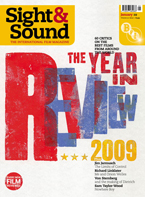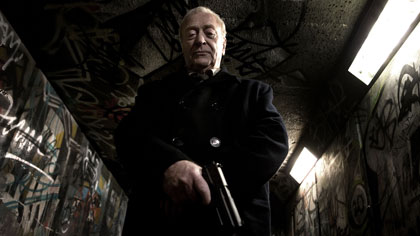Primary navigation

UK 2009

Reviewed by Trevor Johnston
Our synopses give away the plot in full, including surprise twists.
A London council estate, the present. Retired widower Harry Brown, an ex-marine, relies on the company of best friend Leonard, who is fearful of the area's lawless youth. Harry dissuades him from taking the law into his own hands, but subsequently receives a visit from female police officer DI Frampton informing him that Leonard has been killed. Gang leader Noel is among those interviewed about the crime, but there's insufficient evidence to press charges.
Returning late from the pub, Harry fatally stabs Noel's cohort Dean before covering his tracks. He then visits drug dealer Stretch to buy a weapon and, having secured a pistol, shoots him. After murdering a drugs supplier, Harry captures Marky, another in Noel's circle, to plug him for information, and sees mobile-phone footage identifying Noel as Leonard's killer. He shoots Marky and chases Noel, only to collapse on the canal towpath.
DI Frampton begins to suspect that Harry is behind the killings, but is treated with scorn by Superintendent Childs, who's planning a high-profile anti-crime initiative. As massed police raid the estate, Harry leaves hospital and comes to the rescue of Frampton when she's caught in the ensuing riot. They take refuge in Harry's local, where he uses Marky's mobile to smoke out Noel. However, barman Sid reveals that he's Noel's uncle, and attempts to suffocate Harry while Noel grabs Frampton by the throat. Harry shoots Noel dead; Sid is taken out by police marksmen.
A wrinkly hand pulls back the net curtains. Down below, teenagers are breaking into a car, beating up the owner when he arrives to intervene. The nearby pedestrian underpass is flanked by youths waiting to prey on anyone foolish enough to walk their way. Welcome to sinkhole Britain. It's a scenario that, sadly, may not be unfamiliar to elderly residents of inner-city estates, though one might wager that few of them will respond as Michael Caine's eponymous former marine does here - by tooling up with firearms and blowing said ruffians away in no short order. Ah, that's better! Time for the Daily Mail and a nice cup of tea…
No, it's not some ultra-black comedy or mischievous satire; Daniel Barber's directorial debut obviously wants to be taken terribly seriously, hence the positively Kieslowskian murk-green palette, cavernously doomy sound mix and sedulously paced (admittedly fairly effective) opening reel wherein Caine's old codger loses his beloved wife to terminal illness and his best friend (David Bradley) to the local gang who'd been making his days a misery. A shot of Caine on the settee in his neatly kept council flat, facing the realisation of the empty life ahead of him, is held for so long that it registers as self-conscious point-making, a sort of art-movie affectation the rest of the film attempts to sustain even as the story swiftly descends into facile cartoonishness. Once Gary Young's script has hit on the idea of making the protagonist a former soldier who served in Northern Ireland, it's almost as if it needn't bother with any further characterisation.
The sundry lethal shootings that follow, while barely credible in themselves, seem to leave no psychological mark on the grey-haired perpetrator - in this sense the film is even less nuanced than Michael Winner's initial Death Wish instalment, which showed vengeance taking its toll on Charles Bronson's architect-turned-vigilante. In the circumstances, it's hard not to feel that the film is endorsing Harry's pop-a-hoodie perspective - so when Emily Mortimer's well-meaning cop tries to persuade him that he's not in Ulster anymore, the emphatically growled response is that "at least over there they were fighting for something; for this lot it's just entertainment." That this deeply contentious statement is allowed to pass without comment is typical of a film seemingly calculated to embrace Harry's worldview. Thus the assorted yobs are a one-dimensionally loathsome lot, their nefarious activities in the pay of the drugs trade, while even the apparently standup barman at the local boozer has gone over to the dark side. The police, meanwhile, play little part in the equation, Mortimer for instance being sidelined within the force by a commanding officer more interested in high-profile massed raids than sensitive neighbourhood policing.
It's all just too easy, though. Easy to paint these urban environs as the ninth circle of hell. Easy to exploit our feelings for Caine the performer, whose typically solid (if not over-taxed) contribution adds an unwarranted affectionate gloss to a film that oozes contempt for the world it portrays. Gran Torino, while not exactly the title for which Clint Eastwood will be remembered, showed that it's possible to teach errant young folk a lesson, give an elderly star an action role, yet still cleave to values of community and understanding. Harry Brown might just about have got by as a tongue-in-cheek popcorn romp, but by setting itself up as a virtual state-of-the-nation address it only draws attention to its own petty, embittered vacuity.
Gran Torino reviewed by Kate Stables (March 2009)